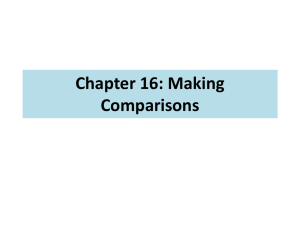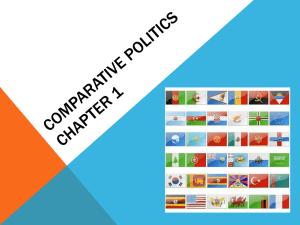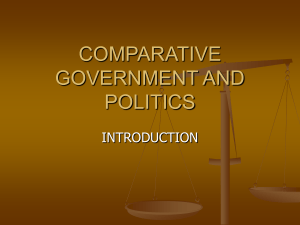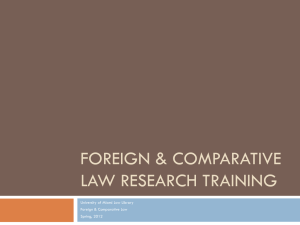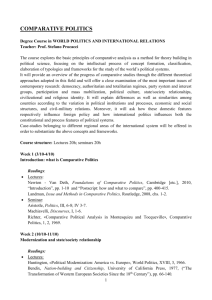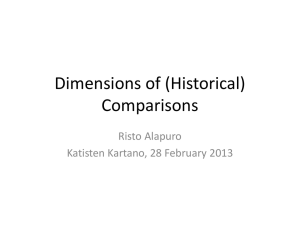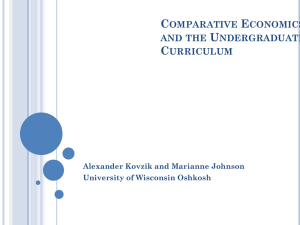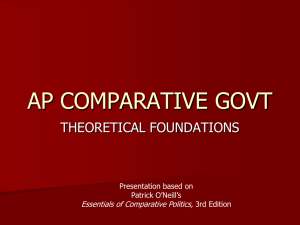Comparative Politics Introductory notes
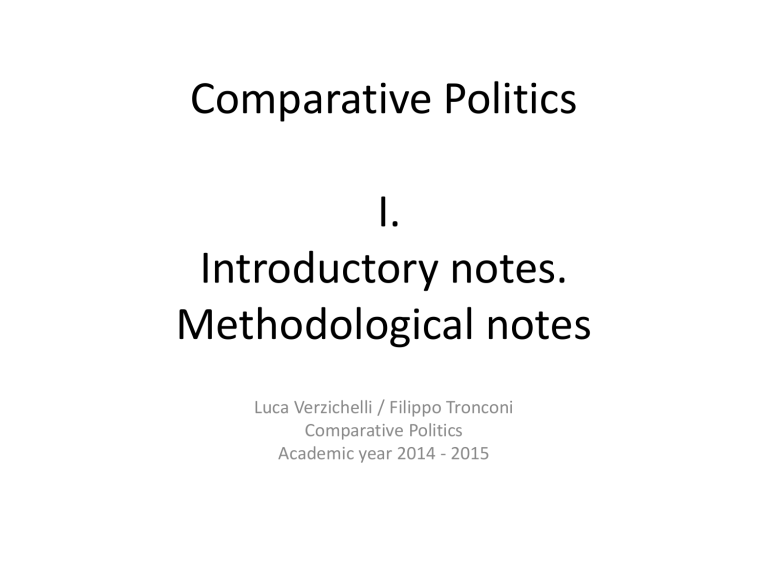
Comparative Politics
I.
Introductory notes.
Methodological notes
Luca Verzichelli / Filippo Tronconi
Comparative Politics
Academic year 2014 - 2015
About the course
Student profile
• Not necessarily a specialist of
comparative politics, but a student curious about politics and interested to the empirical analysis
• A perspective proactive
student. Able to debate problems and perspective of comparative politics, as well as the main approaches of political science
• A perspective professional presenter
Expectations
• A comprehensive discussion of each problem at stake
• A comprehensive review of the literature approached week by week
• Comprehensive (but not boring!) presentations
• A professional “term paper” applying a (restricted) comparative analysis to a specific unit
A look to the syllabus
• Attendance and participation as important criteria for evaluation
• Selective syllabus: we focus on a limited number of topics
(governmental institutions and parties) to have time to discuss it. Core readings are really “core” and compulsory!
• Further stimuli about the “world of comparative politics” to be found in the syllabus (Caramani is particularly indicated to non expert students)
• Advanced PhD course but still “introductory”: presentation style and command of methods and approaches are our main concern
Comparing political phenomena
• Toqueville Democracy in America: example of
(explicit) structural comparison among political systems: “Without comparisons to make, the mind does not know how to proceed”
• Another recent example …
Common Good
Rule by one
Rule by few
Rule by many
Monarchy
Aristocracy (rule by the best)
Polity (ruled by different groups)
Partial / Private Good
Tyranny / Despotism rule of master over slaves
Oligarchy (rule by few)
(wealthy)
Democracy (rule by the people) (poor)
Comparative politics: method or discipline per se?
• Classics works (Toqueville to Wilson) based on the “logic of comparison”
(Mills) without a clear focus on the target of comparative exercise
• Then, long story of consolidation of a (sub)discipline of PS based on (1) a
statutory mission: providing a comprehensive explanation of political phenomena, (2) a scientific ambition: working on non-sperimental scientific environment, and keeping a specific and sophisticated method in order to test hypotheses concerning the variance among political systems.
• Stepping stones after IIWW
Easton (1956): political system as a unit of analysis
Almond and Powell (1966): how to overcome the provincialism in applying the system theory basing our inference on comparisons at the level of analysis of political system
Sartori (1970/1991): comparing instead of miscomparing (conceptual stretching, degreeism, misclassification, parochialism)
Lijphart (1971): selection of case(s) to be studied
Ragin (1994): Constructing social research. QCA and the approach of qualitative comparison
Lijparth 1971: how to minimize the
“too many variable/small N problem”
Lijphart, A. 1971. Comparative politics and the comparative method. American Political Science
Review 65 (Sept): 682-93.
• Increase the number of cases as much as possible
• Reduce the property-space of the analysis
• Focus the comparative analysis on comparative cases
• Focus the comparative analysis on the key variables
Sartori: typical miscomparisons
• Conceptual stretching: A book titled Coalition politics in the US . Be carefull with the use of given expressions
• Degreeism: who fixes the cut off points? As we are not able to see the difference between a cat and a dog, we speak of different degrees of cat-dogs
• Misclassification, christians, Jewish, Muslim, … catholic
• Parochialism, excessive reliance in country based inferences and ignorance on the overall phenomena
Some shared points
• Comparison is a fundamental exercise for all human reflections (empirical and theoretical)
• Comparison is the methodological core of scientific study of social sciences
– compare the past and present
– compare experiences from different nations
– develop explanations
– test theories in non experimental environments
Methods of comparative analysis
Method
Experimental method
Statistical method
Case Study
Comparative method
Strenght
(few application)
Extensive information
In-depth knowledge
Hypothesis testing
Weakness
(Few application)
Little interpretation
Generic comparison
Limited application
• Progressive identification between the idea of application of comparative method(s) and comparative politics …
• … but this implies a dynamic of transformation of the “mission” of comparative politics
(Fabbrini/Molutsi 2011)
We are all comparatists now (Lees 2006)
Evidences from professional consolidation of PS
• Most of top PS journal are truly comparative or “specialised” but open to comparative analyses
• Books on single countries are now much less relevant
Therefore
• Relative isolation of single-country canon
• Necessary innovative and careful use of case study design (Gerring)
Comparative politics theories the 3 neo-institutionalisms
• Rational choice institutionalism
• Historical institutionalism
• Sociological institutionalism
Comparative politics theories the 3 neo-institutionalisms (Hall)
• Historical institutionalism :
Background: response to group theory of politics and structuralfunctionalism. Institutions are formal or informal procedures, routines, norms and conventions embedded in the organizational structure of the polity or political economy.
Key dynamics: path dependency. Trend: sedimentation of similar collective institutions, based on shared values
• Rational choice institutionalism
Same definition of institutions but emphasis on the role of strategic interactions and individual behaviours. Trend: diffusion of model of institutional settings based on dominant views (methodologic individualism).
Later, a second generation of “non institution-free” rational neoinstitutionalism
• Sociological institutionalism
Key variable: ‘social appropriateness’ of given institutional arrangements (but not others). Institutional arrangements thus vary depending on cultural and contextual variables.
Issues of current comparative politics
• Regime changes and democratic development
• Specific institutions
• Actors: parties, movements, interest groups ..
• Quality of democracy and constitutional comparative politics
• Democratic representation and participatory democracy
• Comparative policy analysis and politics of policy making

